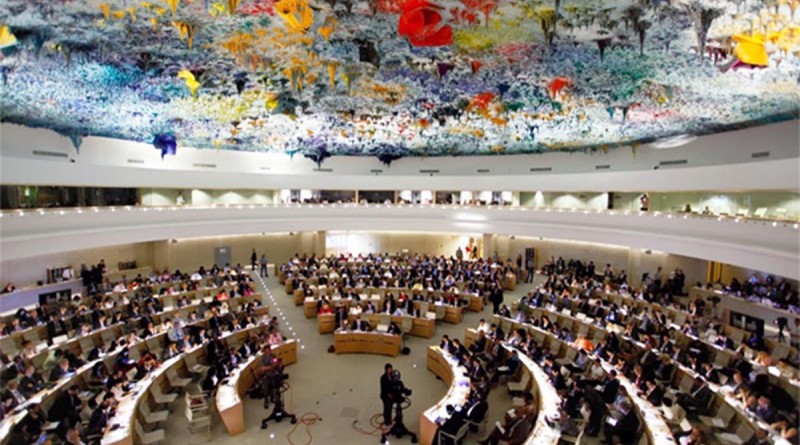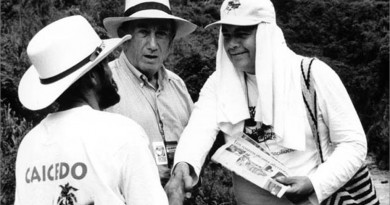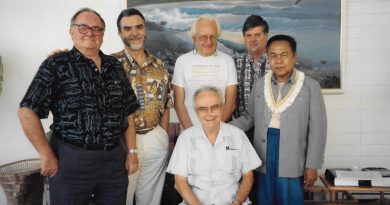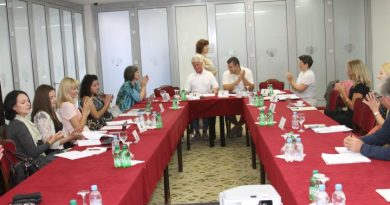Busy month for CGNK at the United Nations Human Rights Council
It started with the biennial debate on the death penalty, the topic being this time the deterrent effect of such a penalty. Our representative at the UN-Geneva, Christophe Barbey, recalled that the main preventive effect needed to preserve life is to value life and that therefore States that practice the death penalty also violate their duty of exemplarity. He then recalled that by promising to “leave no one behind” through the 2030 Sustainable Development Goals, the unanimous member States of the UN left no possible space for the existence of the death penalty, thus calling for the worldwide end of this cruel punishment, as soon as may be, but for 2030.
Then our partner, Selam Kidane, from “Release Eritrea” described the situation in the country, worsened due the Covid Pandemic, locust infestations and the involvement of Eritrean troops in the armed conflict in neighboring Ethiopian province of Tigray.
Our Director, Joám Evans Pim made a Statement on North Korea, recalling the duty, since 1953, of the parties of the armistice agreement to organize a peace conference and to remove the “state of war” in the Peninsula.
He also made two statements for the final approval of the Universal Periodic Review of Panama, congratulating the country for the abolition of the army and for curbing down the homicide rate, yet still calling for more violence prevention and for the ratification of the Convention on Enforced Disappearances.
For Andorra, he also highlighted the absence of armed forces and similarly called for the ratification of the Convention. He also stated that little was needed, more prevention of violence, for the country to become a killing-free country.
Christophe Barbey then made a similar statement for the Marshall Islands congratulating the country for its climate and disarmament policies, calling for more non-killing and life preserving policies and for the swift ratification of the genocide convention. He also recalled the need for a regional human rights institution in the Pacific region.
In joint statement with CPTI (Conscience and Peace Tax International, a partner organization calling for “more money for peace” and for the right to object to military budgets on motives of conscience) concerning the UPR of the USA, he first recalled that the murder rate in the USA is around world average, but yet that much more had to be done the curb the rate, specially by reestablishing funding for violence prevention that had been cut off by the previous administration. He also called on the new administration to hold its word about abolishing the Federal death penalty. Then recalling that peace is the true might, he asked the new administration to pay for peace as much – or more ! – than what they pay for war and to establish a peace tax fund where conscientious objectors to military budget can pay their tax dues.
Then a few days later, our representative prepared submissions for the upcoming UPR sessions of Eswatini (former Swaziland), Suriname and Thailand; for all of them calling for the ratification of the Genocide Convention.
For Samoa, for which we already submitted five years ago, first we noted a lack of updated data on causes of death, including suicides. However, with what we found we sadly noticed a rise in killings and called for more robust and effective prevention mechanisms, for both homicides and suicides. We noted diminishing rates of traffic accidents and called for pursuing these life saving efforts. Finally, here again, we call for the swift ratification of the genocide convention, but also for a change of the Constitution to take out two dispositions, regarding the death penalty which was abolished in the criminal code in 2004 yet still in the Constitution and for the removal of a too permissive clause “allowing” under some circumstances for killings in cases of arrest, escape, riot, etc.
For Antigua and Barbuda, in a joint submission with CPTI, we focused mainly on peace policies. There is a general trend at the UN to reinforce the links between human rights and peace; we use it to progress in both fields. Highlighting similar problems regarding the Constitution of the Country than for Samoa (death penalty not practiced but still in the constitution, a permissive clause regarding killings in special circumstances and again a ratification problem, but this time for the Enforced disappearances convention), we then moved to described what would or will be ideal “comprehensive peace policies”. Peace as a State goal, as a guidance for all State activities, as a human right giving ownership and control on peace policies to the people, to see peace and non-violence – including nonkilling ! – taught in schools, to improve mediation, soft justice and prevention of conflicts and violence, to grant greater control on public use of force and concluding by asking for the abolition of the army, Antigua and Barbuda having one of the smallest armies of the world, with little military clout and barely no international missions, thus to be reintegrated into the police.
The work at the UN is done on a very small grant, please consider sharing some of your excess earning or belongings to support this life enhancing work. Thank you.




